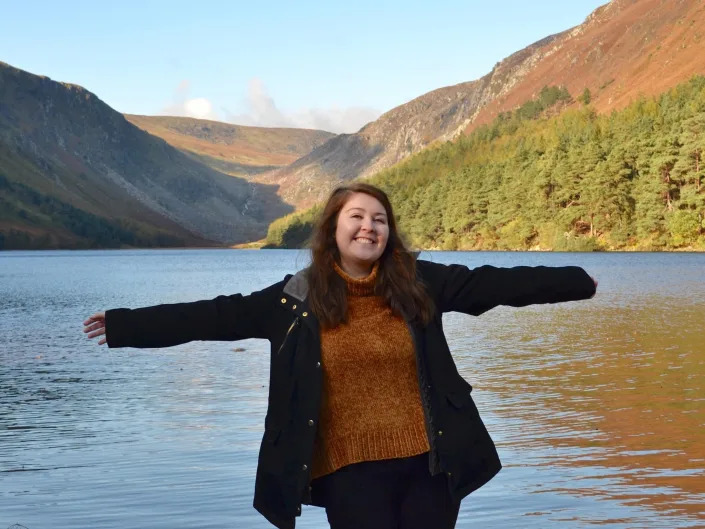
Three years ago, I moved from the US to Ireland on the Irish Working Holiday Visa.
It was difficult to find a full-time job, affordable housing, and a good group of friends.
The country can be expensive, but I have learned there is so much to see.
I moved from the US to Ireland in 2019.
I only had two suitcases, $4,000 in savings, and a folder of paperwork for my Irish Working Holiday Visa, which allows recent graduates to travel and work in Ireland for a year.
I set off with no job or housing lined up, no relatives or connections to the country, and basically no plans in general, and I have gotten so many questions from people around the world wanting to know how I did it.
I wish I could have given my young self some words of wisdom.

Ireland is a very expensive place to live, and my savings disappeared more quickly than I anticipated.
I saved as much as I could before I arrived because I knew it would give me a better chance of finding a job.
I didn't go out on nights out or eat with friends for a year before moving. I reasoned that I would rather have a beer in Dublin than a coffee in Missouri.

For months before moving, I received the same response from job applications: "Let's talk when you're on the ground."
You will only get serious responses once you are physically located in Ireland, with your Irish address and phone number listed on your resume.
Dublin has a very competitive job market. I applied to hundreds of jobs and didn't hear back from most of them. I started nannying to get experience in Ireland on my CV.
Although there are plenty of casual and short-term jobs, you will be competing with other Irish high-school and college students as well as young people from the European Union.
Those groups fill up spots first for temp roles and tourism jobs.
My only professional experience before moving to Ireland was at a nonprofit. I assumed that the only places I would find work were coffee shops and retail stores when I was fresh out of college.
After several months of no luck, I was finally able to break into my field by networking through several recruitment agencies.
This was the easiest way to get a full-time job in Dublin. I was able to get permanent-contract roles in my field.
Sponsorship is an option for those who want to stay permanently in Ireland. If you stick to the job for two to four years, your employer could sponsor you for a work visa, which would eventually earn you permanent residency.
It is difficult to find housing in Ireland, but it is difficult to find housing in Dublin. It is getting harder every year.
If you go to a packed viewing for a single bedroom for rent in a shared house, you will not be alarmed. When that bedroom comes with a whopper of a price tag, don't be surprised.
In Dublin, you can spend up to $2,000 a month on rent, and even in smaller towns, it can be as much as 1,500 a month.
I made the mistake of keeping my American phone number for a long time, which made it hard for me to get anything in Ireland.
People seem to trust you more when you have an Irish number. I recommend making the switch as soon as possible because it shows a commitment to living here and putting down roots.
To make life easier, you can pay to have your phone unlocked and buy an Irish sim card with a noncontractual phone plan.
If you are just traveling around Europe and don't want to pay the over-the-top fees for international data and calls, you can buy a cheap sim card wherever you are staying. They last about 28 days.
You can use social media and maps wherever you go with this freedom.
It is important to research how voting works in your country when moving abroad.
Irish citizens have to make a special trip back home if they want to vote in Ireland. US citizens living abroad still have the right to vote.
I have voted online for the last two US presidential elections and it was very easy to do.
Irish people love to talk about the weather. The country is well-known for being windy, dreary, and rainy, so be sure to pack accordingly.
Everyone is excited for the months of dark and wet days to finally be over when March rolls around.
In Ireland, there can be occasional glorious weather from March to September.
Although the summers are much milder, it can be overcast and rain can start pouring at any time out of a perfectly blue sky.
The age-old Irish saying is "You can see every season in a day" because of the unpredictable weather.
I had two large suitcases when I first traveled to Ireland. If not more than enough, one would have been plenty.
Ireland has some great cheap shops to pick up whatever you need at home, so only pack what you are prepared to lift up multiple flights of stairs and roll down narrow cobblestone streets.
Penneys is a staple in Ireland. You can buy a lot of things under the sun. It is cheap without really skimping on quality.
Ireland has UNESCO World Heritage sites, world-class beaches, and quirky villages that make it a fascinating country to visit.
It is a small state with a lot of different counties and different bits of ancient history.
I don't own a car, so I rely on public transport to get around, which is more convenient and cheaper than driving in the city.
Driving is the best way to explore Ireland because it is so rural, with many winding and narrow country roads that don't even recognize you.